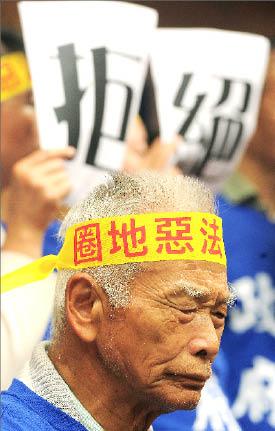The Taiwan Rural Front (TRF) and farmers yesterday protested the passing of proposed revisions to the second reading of the Land Expropriation Act (土地徵收條例) and called Premier Wu Den-yih (吳敦義) a “liar” for failing to include certain items into the Cabinet version revisions that they said he had promised.
“When meeting with us in July, Wu promised that he would hold further talks on revisions to the Land Expropriation Act to listen to what farming rights advocacy groups and farmers had to say,” said Liao Pen-chuan (廖本全), an associate professor at National Taipei University’s Department of Real Estate and Built Environment, at a news conference at the Legislative Yuan.
“Months have passed by, and the next thing we heard about the law is that the proposed revisions have been incorporated into the second reading without going through the first reading process,” Liao said.

Photo: Liu Hsin-de, Taipei Times
Liao, a TRF member, was one of those who spoke to Wu in a meeting at the Executive Yuan where the TRF staged a protest in July.
According to Taiwan’s legislative system, a proposed bill or amendment is introduced to the legislature in a first reading, in which the lawmaker or government official who proposed the bill or the amendment introduces the amendments before it goes to further committee review and debate in a second reading.
A proposed bill or amendment is often a foregone conclusion by the time it reaches the second reading, after which it is sent to the general assembly at the Legislative Yuan for the third reading and a final vote before it becomes law.
“Wu is practically a liar, because he never called a meeting with non-governmental organizations [NGO] as he promised and sent the proposed amendments straight for a second reading on Thursday,” Liao said.
Thomas Chan (詹順貴), another member of the TRF and an attorney who represents farmers and farming activists in lawsuits, agreed with Liao that Wu is a liar, but said it was for a different reason.
“We NGOs also proposed our version of revisions to the law, which included clauses requiring developers to clarify the ‘necessity’ and ‘public interests’ involved before a land expropriation deal could be approved by the government,” Chan said. “We also wanted third-party real-estate appraisers to estimate the value of land to be seized by the government.”
While Wu said he accepted the TRF’s ideas, “none of what we wanted made it into the Cabinet--proposed amendments,” Chan said.
Miaoli County’s Wanbao Self-Help Association president Chen Hsing-hsiung (陳幸雄) called on lawmakers and the government to include clauses proposed by farming rights groups to better protect people’s rights to their lands.
Wanbao Borough (灣寶) of Miaoli County’s Houlong Township (後龍) was one of the farming villages facing government seizure of their land for development projects.
The Wanbao crisis was resolved when the Ministry of the Interior rejected the development project, but Wanbao residents are still familiar faces supporting others struggling against land expropriation.

SHIPS, TRAINS AND AUTOMOBILES: The ministry has announced changes to varied transportation industries taking effect soon, with a number of effects for passengers Beginning next month, the post office is canceling signature upon delivery and written inquiry services for international registered small packets in accordance with the new policy of the Universal Postal Union, the Ministry of Transportation and Communications said yesterday. The new policy does not apply to packets that are to be delivered to China, the ministry said. Senders of international registered small packets would receive a NT$10 rebate on postage if the packets are sent from Jan. 1 to March 31, it added. The ministry said that three other policies are also scheduled to take effect next month. International cruise ship operators

HORROR STORIES: One victim recounted not realizing they had been stabbed and seeing people bleeding, while another recalled breaking down in tears after fleeing A man on Friday died after he tried to fight the knife-wielding suspect who went on a stabbing spree near two of Taipei’s busiest metro stations, Taipei Mayor Chiang Wan-an (蔣萬安) said. The 57-year-old man, identified by his family name, Yu (余), encountered the suspect at Exit M7 of Taipei Main Station and immediately tried to stop him, but was fatally wounded and later died, Chiang said, calling the incident “heartbreaking.” Yu’s family would receive at least NT$5 million (US$158,584) in compensation through the Taipei Rapid Transit Corp’s (TRTC) insurance coverage, he said after convening an emergency security response meeting yesterday morning. National

PLANNED: The suspect visited the crime scene before the killings, seeking information on how to access the roof, and had extensively researched a 2014 stabbing incident The suspect in a stabbing attack that killed three people and injured 11 in Taipei on Friday had planned the assault and set fires at other locations earlier in the day, law enforcement officials said yesterday. National Police Agency (NPA) Director-General Chang Jung-hsin (張榮興) said the suspect, a 27-year-old man named Chang Wen (張文), began the attacks at 3:40pm, first setting off smoke bombs on a road, damaging cars and motorbikes. Earlier, Chang Wen set fire to a rental room where he was staying on Gongyuan Road in Zhongzheng District (中正), Chang Jung-hsin said. The suspect later threw smoke grenades near two exits

The Forestry and Nature Conservation Agency yesterday launched a gift box to market honey “certified by a Formosan black bear” in appreciation of a beekeeper’s amicable interaction with a honey-thieving bear. Beekeeper Chih Ming-chen (池明鎮) in January inspected his bee farm in Hualien County’s Jhuosi Township (卓溪) and found that more than 20 beehives had been destroyed and many hives were eaten, with bear droppings and paw prints near the destroyed hives, the agency said. Chih returned to the farm to move the remaining beehives away that evening when he encountered a Formosan black bear only 20m away, the agency said. The bear